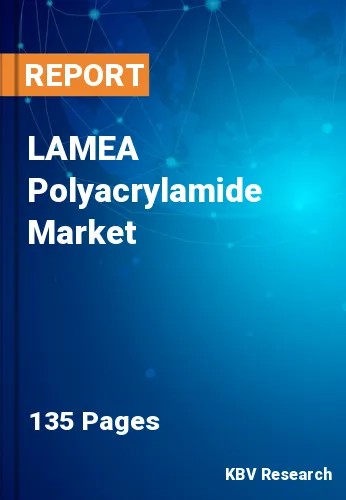The Latin America, Middle East and Africa Polyacrylamide Market would witness market growth of 7.5% CAGR during the forecast period (2023-2030). In the year 2026, the LAMEA market's volume is expected to surge to 284.3 Kilo Tonnes, showcasing a growth of 6.6% (2023-2030).
EOR, often called tertiary recovery, is a set of advanced techniques employed in the oil and gas industry to extract additional hydrocarbons from reservoirs that cannot be effectively recovered using primary or secondary methods. These mature oil fields have significantly declined production rates, leaving a substantial volume of oil trapped underground. One of the primary EOR techniques is water flooding, where water is injected into the reservoir to displace oil and push it towards production wells. However, water and oil tend to separate, resulting in a phenomenon known as fingering, where water channels through the reservoir, leaving large pockets of trapped oil. Polyacrylamide is used to modify the viscosity of injected water, reducing fingering and ensuring a more even sweep of the reservoir. This process, known as polymer flooding, enhances oil recovery rates.
In addition, agriculture relies on polyacrylamide for soil conditioning and erosion control. PAM-based soil conditioners help improve water infiltration, reduce soil erosion, and enhance crop yields. It is also used in irrigation systems to improve water distribution. In the paper and pulp industry, polyacrylamide is a retention and drainage aid during papermaking. It aids in increasing the retention of fine particles, improving paper quality, and reducing wastewater generation.
The United Arab Emirates (UAE) has been known for its robust construction industry, characterized by iconic skyscrapers, large-scale infrastructure projects, and ambitious urban development initiatives. As per the Dubai Statistics Center, in 2022, there were 13,236 buildings under construction in Dubai and 1,941 completed buildings. Rapid urbanization has increased demand for housing, commercial spaces, transportation networks, and public amenities. Cities like Dubai and Abu Dhabi have grown substantially, requiring more infrastructure and real estate developments. Therefore, the demand for polyacrylamides will increase significantly in the LAMEA region.
The Brazil market dominated the LAMEA Polyacrylamide Market, by Country in 2022, and would continue to be a dominant market till 2030; thereby, achieving a market value of $159 Million by 2030. The Argentina market is showcasing a CAGR of 8.1% during (2023 - 2030). Additionally, The UAE market would register a CAGR of 7.2% during (2023 - 2030).
Based on Product, the market is segmented into Anionic, Cationic, and Non-ionic. Based on Application, the market is segmented into Water Treatment, Oil & Gas, Paper Making, and Others. Based on countries, the market is segmented into Brazil, Argentina, UAE, Saudi Arabia, South Africa, Nigeria, and Rest of LAMEA.
Free Valuable Insights: The Worldwide Polyacrylamide Market is Projected to reach USD 8.8 Billion by 2030, at a CAGR of 6.6%
The market research report covers the analysis of key stake holders of the market. Key companies profiled in the report include Anhui Jucheng Fine Chemicals Co., LTD, Ashland, Inc., BASF SE, Kemira Oyj, SNF Group, Black Rose Industries Ltd., Shandong Baomo Biochemical Co., Ltd., Xitao Polymer Co., Ltd., The Dow Chemical Company (Dow Corning Ltd.), and Solvay SA.
By Product (Volume, Kilo Tonnes, USD Million, 2019-2030)
By Application (Volume, Kilo Tonnes, USD Million, 2019-2030)
By Country (Volume, Kilo Tonnes, USD Million, 2019-2030)
Our team of dedicated experts can provide you with attractive expansion opportunities for your business.

